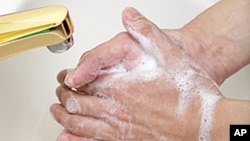Americans use a lot of antibacterial soaps, but today the U.S. Food and Drug Administration banned 19 chemicals commonly found in them.
“Companies will no longer be able to market antibacterial washes with these ingredients because manufacturers did not demonstrate that the ingredients are both safe for long-term daily use and more effective than plain soap and water in preventing illness and the spread of certain infections,” the FDA wrote in a news release.
In its ruling, the FDA said this would apply to soaps containing any of the 19 chemicals, including triclosan, found in liquid soaps, and triclocarbon, found in soap bars.
The FDA said some soap manufacturers had already removed these ingredients.
“Consumers may think antibacterial washes are more effective at preventing the spread of germs, but we have no scientific evidence that they are any better than plain soap and water,” said Janet Woodcock, M.D., director of the FDA’s Center for Drug Evaluation and Research (CDER). “In fact, some data suggests that antibacterial ingredients may do more harm than good over the long-term.”
Antibacterial hand wipes, liquid hand sanitizers and other products used in a “healthcare setting” are not covered by the ruling.
In 2013, the FDA proposed the ban, saying that using antibacterial soaps containing these chemicals “could pose health risks, such as bacterial resistance or hormonal effects.”
The agency sought further data from manufacturers that showed the soaps were effective but said such data was not provided.
Manufacturers have one year to comply to the FDA’s ruling.
While the FDA maintains that simple soap and water is the best way to prevent spreading germs, if they are not available, the U.S. Centers for Disease Control and Prevention recommends using a hand sanitizer with at least 60 percent alcohol.





